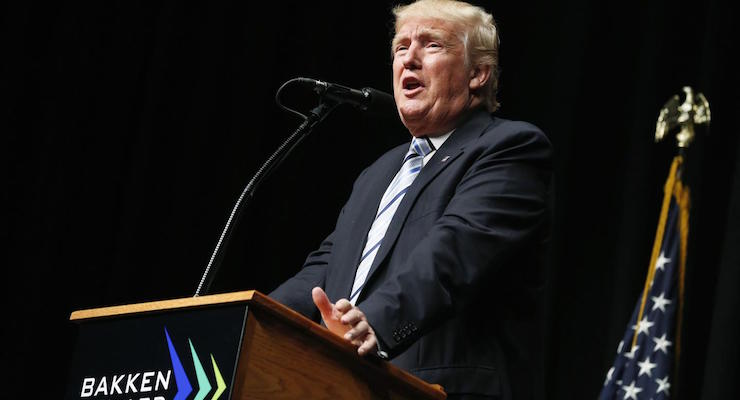

Presumptive Republican nominee Donald Trump speaks at the Williston Basin Petroleum Conference in Bismarck, North Dakota, to deliver his major energy policy and climate speech, on May 26. (Photo: Reuters)
Before the lynching of The Donald proceeds, what exactly was it he said about that Hispanic judge?
Stated succinctly, Donald Trump said U.S. District Judge Gonzalo Curiel, who is presiding over a class-action suit against Trump University, is sticking it to him. And the judge’s bias is likely rooted in the fact that he is of Mexican descent.
Can there be any defense of a statement so horrific?
Just this. First, Trump has a perfect right to be angry about the judge’s rulings and to question his motives. Second, there are grounds for believing Trump is right.
On May 27, Curiel, at the request of The Washington Post, made public plaintiff accusations against Trump University — that the whole thing was a scam. The Post, which Bob Woodward tells us has 20 reporters digging for dirt in Trump’s past, had a field day.
And who is Curiel?
An appointee of President Obama, he has for years been associated with the La Raza Lawyers Association of San Diego, which supports pro-illegal immigrant organizations.
Set aside the folly of letting Clinton surrogates like the Post distract him from the message he should be delivering, what did Trump do to be smeared by a bipartisan media mob as a “racist”?
He attacked the independence of the judiciary, we are told.
But Presidents Jefferson and Jackson attacked the Supreme Court, and FDR, fed up with New Deal programs being struck down, tried to “pack the court” by raising the number of justices to 15 if necessary.
Abraham Lincoln leveled “that eminent tribunal” in his first inaugural, and once considered arresting Chief Justice Roger Taney.
The conservative movement was propelled by attacks on the Warren Court. In the ’50s and ’60s, “Impeach Earl Warren!” was plastered on billboards and bumper stickers all across God’s country.
The judiciary is independent, but that does not mean that federal judges are exempt from the same robust criticism as presidents or members of Congress.
Obama himself attacked the Citizens United decision in a State of the Union address, with the justices sitting right in front of him.
But Trump’s real hanging offense was that he brought up the judge’s ancestry, as the son of Mexican immigrants, implying that he was something of a judicial version of Univision’s Jorge Ramos.
Apparently, it is now not only politically incorrect, but, in Newt Gingrich’s term, “inexcusable,” to bring up the religious, racial or ethnic background of a judge, or suggest this might influence his actions on the bench.
But these things matter.
Does Newt think that when LBJ appointed Thurgood Marshall, ex-head of the NAACP, to the Supreme Court, he did not think Marshall would bring his unique experience as a black man and civil rights leader to the bench?
Surely, that was among the reasons Marshall was appointed.
When Obama named Sonia Sotomayor to the Supreme Court, a woman of Puerto Rican descent who went through college on affirmative action scholarships, did Obama think this would not influence her decision when it came to whether or not to abolish affirmative action?
“I would hope that a wise Latina woman with the richness of her experiences would more often than not reach a better conclusion than a white male who hasn’t lived that life,” Sotomayor said in a speech at Berkeley law school and in other forums.
Translation: Ethnicity matters, and my Latina background helps guide my decisions.
All of us are products of our family, faith, race and ethnic group. And the suggestion in these attacks on Trump that judges and justices always rise about such irrelevant considerations, and decide solely on the merits, is naive nonsense.
There are reasons why defense lawyers seek “changes of venue” and avoid the courtrooms of “hanging judges.”
When Obama reflexively called Sgt. Crowley “stupid” after Crowley’s 2009 encounter with that black professor at Harvard, and said of Trayvon Martin, “If I had a son, he’d look like Trayvon,” was he not speaking as an African-American, as well as a president?
Pressed by John Dickerson on CBS, Trump said it’s “possible” a Muslim judge might be biased against him as well.
Another “inexcusable” outrage.
But does anyone think that if Obama appointed a Muslim to the Supreme Court, the LGBT community would not be demanding of all Democratic Senators that they receive assurances that the Muslim judge’s religious views on homosexuality would never affect his court decisions, before they voted to put him on the bench?
When Richard Nixon appointed Judge Clement Haynsworth to the Supreme Court, it was partly because he was a distinguished jurist of South Carolina ancestry. And the Democrats who tore Haynsworth to pieces did so because they feared he would not repudiate his Southern heritage and any and all ideas and beliefs associated with it.
To many liberals, all white Southern males are citizens under eternal suspicion of being racists. The most depressing thing about this episode is to see Republicans rushing to stomp on Trump, to show the left how well they have mastered their liberal catechism.






